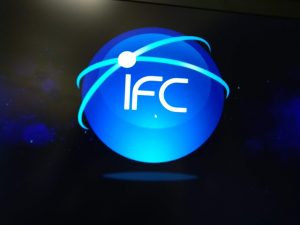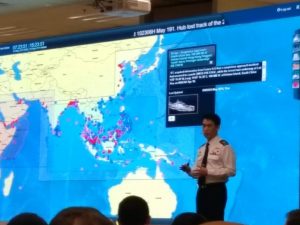
Singapore is host to one of the most successful initiatives for sharing information and developing maritime domain awareness on a regional level. The Information Fusion Centre (known as IFC) operated by the Singaporean navy has become a global template for how to improve the flow of maritime information, conduct solid analysis of activities and trends at sea, but also to react rapidly to any maritime incident across borders and jurisdictions.
On the 14th of May the IFC celebrated its 10th anniversary. At the celebration it also launched the new information sharing platform of the centre. The celebration was part of the annual exercise MARISX.
I had the opportunity to attend the event as an observer. Following my earlier visits to the IFC in 2018 and 2015 (see my article on the IFC here), I could for the first time see the exercise in action. MARISX brought together participants from ASEAN navies and coastguards, and various international partners, including Australia, China, Germany, India, Seychelles, the UK or the US. For three days participants had the opportunity to try out the brand new IFC Real-time Information-sharing System (IRIS) to address real life scenarios, such as illegal fishing, illegal migration or piracy incidents. The participants also discussed how such incidents can be better managed jointly using the platform. A number of national operational centers (OPCENs) from different countries participated remotely in the exercise. Also representatives from the shipping industry, including the Singapore Shipping Association or Intertanko, as well as international organisations such as Interpol and UNODC contributed to the event.

The new IRIS platform is a significant step forward. Designed as an open system, that is essentially a map filled with data and various search and tracking function the new system is very accessible and also available as a mobile phone version. During my participation in MARISX I found the software easy to use and it was certainly fast and reliable. The IRIS platform is integrated with two Microsoft tools: SharePoint allows for storing and sharing files, such as incident reports, while Skype for Business provides chat, VoIP communication and the sharing of pictures and other files between users. With this set up the IFC is certainly future proof and ready to continue leading the development of regional maritime domain awareness systems. A number of challenges will become important in that future:
This firstly concerns the need to ensure interoperability of IRIS with other regional and global information sharing platforms. In the light of the recent proliferation of regional maritime domain awareness systems, this will be important to avoid overlap or even competition between systems. There is a need to integrate or relations to platforms such as the Seavision platform of the US Navy, the Indian Ocean Regional Information Sharing (IORIS) platform developed by the EU and operated in the centers in Madagascar and Seychelles, as well as the platforms developed within the Djibouti Code of Conduct and the most recent Information Fusion Centre Indian Ocean Region (IFC-IOR) opened by India in late 2018.
Secondly, as more and more data becomes available through new sensors and the digitization of trades and customs, one future challenge will be to better manage the amount of data. This will imply to continuously improve automated sense-making capacities to allow finding the needle in the haystack and identify suspicious activities or high risk transports.
Thirdly, information sharing and developing a shared picture of activities at sea through MDA is an important step in bringing countries together to tackle maritime security challenges together. The next step is however to coordinate international operations and optimize regional patrols. Multi-national patrols are already successfully carried out, for instance, in the frame of the Combined Maritime Forces operating in the Western Indian Ocean, or on a smaller scale the Trilateral Maritime Patrols (TMP) initiative in the Sulu and Celeb Seas. If countries complement the shared MDA picture by also providing the positions of their naval and coast guards assets than this can vastly improve the patrols that can be carried out both in terms of coverage as well as response time to incidents.
Pingback: Maritime Security Cooperation in Southeast Asia. Recent events in the region | // SAFE SEAS